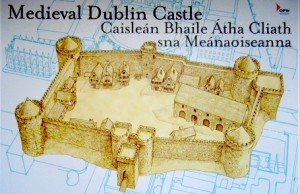Whether writing historic or alternative history fiction (or even when world-building in a fantasy or Sci-Fi genre), it is often necessary to describe society’s political and social structure. This is so in my second novel, which takes place in 11th century Ireland.
Prior to the 19th (or so) century, Kings seem to be the prevalent governing structure. Being totally immersed in our established democracy and firmly accepting that all are created equal, I wondered by people put up with any type of aristocracy.
The book “Slaves and Warriors in Medieval Britain and Ireland, 800 to 1200” by David Wyatt shed quite a bit of light on the formation of medieval societies and let to my eventual acceptance and, perhaps, support of the historic necessity of Kings.
I read Dr. Wyatt’s book while researching the “institution” of slavery. Note: I used the inter-library loan system at my local library as the book is out of print and used copies run approximately $200 on Amazon.
The book does a great job of describing emerging societies. My take-away is as follows:
- Early societies were violent. Anyone without a personal connection is a target for theft, slavery or rape. People banded together for protection. One leader would emerge and trade his protection for the loyalty of followers. There was no sense of Nation.
- Anyone outside this leader-follower structure is a target. Only within the leader-controlled areas do neighbors (typically) not kill each other.
- As the “leader” extended his/her influence, this area of protection increases.
- When a leader controls enough territory, he calls himself a King and the territory becomes a Nation, resulting in an even larger pool of inhabitants that become non-targets to each other.
Unfortunately, with more than one King in the world, King/Nation to King/Nation violence started and spread, a notable example being the centuries long spat between the English and the French Monarchs. At least until Kings were supplemented by democracies.
Another serious downside is that intermediate social levels such as lords, knights, clerics and other privileged classes are formed. While they helped enforce peace at the local level, violence between classes (top down) still existed.
So, while Kings are not in favor in the modern world (except ceremonially), they served a vital function in the past to reduce overall violence and to generate a sense of Nation as societies evolved.
Note: I accept that this post is a bit simplistic. Problems did persist; one being when, for political reasons, specific minorities were persecuted by the King. Another is the heavy burden of taxation on the lower classes (to support the upper classes).
Amazon affiliate link to referenced book: Slaves And Warriors in Medieval Britain and Ireland, 800 – 1200


Jared Diamond sheds light on the very similar development of state order upon tribal societies. In his The World Until Yesterday he describes the recent progress in New Guinea where tribal law was recently lead to a legal system of the state. Multitribal New-Guinean society jumped into a state without Kings and Knights… Jared Diamond shows the pros and cons of this change by the legal treatment of a fatal trafic accident. Worth of reading the details.
Another interesting book on Irish (only) history is “The Course of Irish History,” edited by Moody and Martin. This collection of Essays has something for everyone — provided Ireland is the topic. A few of the chapters/essays deal with the sociopolitical structure of Ireland.
Interesting info. Makes complete sense, Walt.